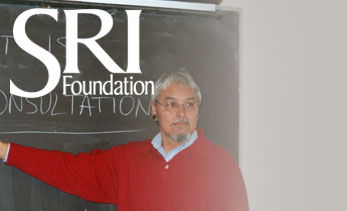SRI Foundation
Continuing Professional Education Workshops
We don’t schedule our workshops in some central location and expect people to pay travel and per diem costs to come to us.
Our workshops come to you!
We offer two options for arranging workshops.
Click on the buttons below to find out more information.
We provide on-site training for government and private sector clients.
Choose from one of our pre-developed workshops listed below or we can create a customized workshop catered to fit your organization’s needs.
We partner with government and private clients to provide training locally.
Partners receive free training!
How well do you know the current legal requirements under Section 106 of the National Historic Preservation Act or the National Environmental Policy Act?
Here is a fun opportunity to “Test Your Historic Preservation Strength!” (181 KB PDF)
Section 106 of the National Historic Preservation Act
This one-day workshop covers the what, who, why, and how of compliance with Section 106 of the National Historic Preservation Act. It offers a basic understanding of Section 106 compliance and introduces such key issues as tribal consultation, coordination with the National Environmental Policy Act, and the role of agreement documents, and strategies for avoiding common problems. Continuing legal education (CLE) credits may be available for this workshop.
Section 106: Principles and Practice
This two-day workshop on compliance with Section 106 of the National Historic Preservation Act provides a more in-depth understanding of the Section 106 process, working with consulting parties, and bringing projects to a successful completion.
Completing Section 106: Resolving Adverse Effects and Writing Agreement Documents
This two-day advanced workshop is intended for practitioners who are familiar with the basics of Section 106 compliance. The seminar-style workshop focuses on advanced knowledge, solving common problems, and preparing the agreement documents that bring the Section 106 process to a successful closure.
For more information on this advanced workshop, contact Terry Klein at
.
Working with Section 106 of the National Historic Preservation Act:
Preserving the Places that MatterThis two-day workshop for Indian tribes begins with a practical review of the Section 106 process in general and particularly as it relates to tribal concerns and issues such as tribal authority on tribal land versus off tribal land, cultural resource identification and evaluation, assessment of effects, and resolution of adverse effects, including preparation of Section 106 agreement documents. The workshop also provides practical suggestions about how tribes can make the most effective use of their opportunities for input in the Section 106 consultation process .
National Highway Institute Course on Historic Preservation
The SRI Foundation is co-teaching a National Highway Institute (NHI) course, entitled “Beyond Compliance: Historic Preservation in Transportation Project Development” (Course Number 142049). This course, developed by SRI Foundation, AMEC Earth & Environmental, Inc., and the University of Maryland, is designed to help transportation, NEPA, and historic preservation professionals meet the requirements of Section 106 regulations and take advantage of the flexibility and autonomy offered in the regulations. The course focuses on the fundamentals of NEPA, Section 106, and Section 4(f) of the Department of Transportation Act, and provides techniques for coordinating transportation planning, project development and compliance with these three laws. The course emphasizes practical approaches for real-world situations and the importance of balancing stewardship and project delivery. Information on this course is available at the NHI website.
“This was a well taught class that incorporated positive participation from its members.”
“Relevant to my work, provided wealth of information, good case studies and examples.”
‘In general, the information provided in the course will be extremely useful in executing projects more efficiently and logically. The instructors’ levels of expertise were extraordinary.”
“Excellent presentations made by seasoned professionals. Strong examples which showed 'real world' application.”
Home | About SRIF | Continuing Professional Education | Educational Resources & Opportunities
SRI Foundation • 4101 Corrales Road Unit 2438 Corrales, NM 87048
(505) 892-5587 • Fax (505) 896-1136
For
information on the SRI Foundation, you can also contact Terry Klein
at ![]()









